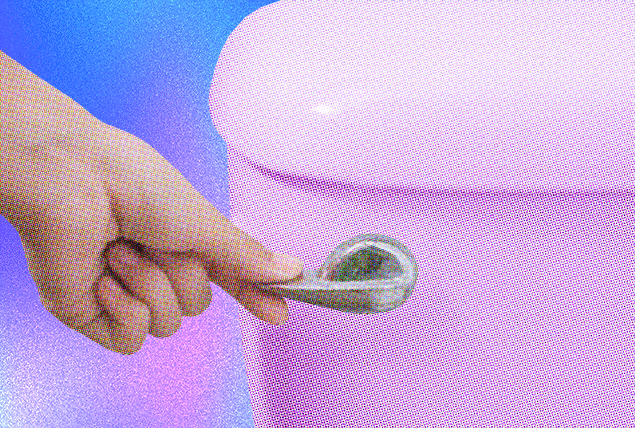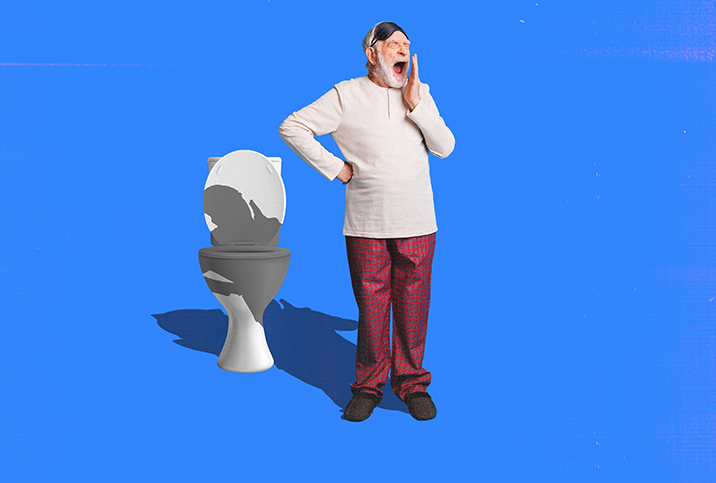Please Stop Believing These 8 Male UTI Inaccuracies

You may associate urinary tract infections (UTIs) with females, but the truth is UTIs can, and do, occur in people with penises.
You shouldn't assume that since males don't deal with the issues females do in introducing bacteria to their genital areas that UTIs aren't a risk. In reality, male UTIs occur more often than you might think. Importantly, they can be a signal that there is a bigger medical issue at play.
With males especially, there can be a lot of UTI inaccuracies, from their symptoms to their prevalence to how serious they can be.
Here's what you need to believe (and stop believing) about male UTIs.
Inaccuracy #1
Men don't have to worry about UTIs
First, let's clear up this misconception. Biological males can and do get UTIs. While it's true females get them more frequently—up to 30 times more than males—UTIs still occur in men.
Three out of every 25 men get symptoms of a UTI during their lifetime, according to the American Urological Association (AUA).
The reason males get UTIs at a much lower rate than females is that their urethras are longer and, thus, better able to keep bacteria at bay.
"A woman's urethra is shorter and closer to the vagina and the rectum, where bacteria live and grow," said Eric Chan, M.D., a urologist at Clara Maass Medical Center in New Jersey, part of the RWJBarnabas Health Medical Group.
However, bacteria can still find a way to cause a UTI in men, and other causes can contribute to the infection.
Inaccuracy #2
UTIs are always caused by bacteria
OK, so UTIs are technically caused by bacteria, but it's the events leading up to the bacterial incursion that are important to understand here. Certain risk factors make a man more susceptible to getting a UTI, Chan said, such as the following:
- Being genetically predisposed
- Having anatomy or biology that makes them more at risk
- Having an enlarged prostate
- Being obese
- Any sort of immune system issues
- Having received an organ transplant
- Having diabetes
Diabetes can be a common risk factor for male UTIs, Chan said. How? The condition can cause sugar to leak from the blood into the urine, which allows bacteria to grow and multiply and potentially cause infections.
Additionally, males who hold in their urine for a prolonged period or have had prior UTIs are at a higher risk of developing another one.
"The penis is not prone to UTI," said S. Adam Ramin, M.D., a urologic surgeon and the medical director of Urology Cancer Specialists in Los Angeles.
Ramin added, however, that any man who has had a previous urethral infection or trauma to the penis can develop stricture in the urethra, which can then cause urine blockage and lead to infections.
Inaccuracy #3
There's only one kind of UTI
A UTI is a UTI, right? Well, not exactly, according to Ramin. He explained there are actually five different categories of male UTIs:
- Cystitis, a bladder infection
- Prostatitis, a prostate infection
- Urethritis, a urethral infection
- Pyelonephritis, a kidney infection
- Epididymitis/orchitis, a testicular infection
Of the five types, he noted that urethral, kidney and testicular infections are the rarest, while bladder and prostate infections are more common.
Inaccuracy #4
A UTI is "just" a UTI
While a urinary tract infection might not seem like a big deal—just get some antibiotics and you're good to go, right?—Ramin explained that in many instances, a UTI is the first indication there's a different urological problem lurking.
Certain underlying issues and conditions could predispose a man to UTIs. If you notice a problem with recurrent infections, it's a good idea to talk to a doctor about what else might be happening.
"It's important for the provider to do a workup and determine the root cause of the first UTI, then treat the problem," Ramin said.
Some of the underlying problems that could cause male UTIs include the following:
- Diabetes
- Spinal disorders that cause bladder muscle dysfunction
- Urethral stricture disease
- Enlarged prostate
- Incomplete bladder emptying
- Kidney stones
- Bladder stones
- Unprotected anal or vaginal intercourse
- Occupations that require men to sit for prolonged hours, such as drivers, lawyers and computer programmers
Inaccuracy #5
UTIs always cause symptoms
Some of the typical symptoms associated with UTIs include burning and pain with urination, Chan said. In some situations, though, a UTI can be present without any symptoms.
Ramin added that a man may experience less typical symptoms with a UTI, such as:
- Lower abdominal pain
- Back pain
- A slow urinary stream
- Painful ejaculation
Inaccuracy #6
UTIs are a young person's problem
Sexual activity and UTIs are often linked. After all, the mingling and mixing of bodily fluids can certainly introduce bacteria. The AUA notes, however, that for males especially, the risk of UTIs can increase with age.
Men older than age 70, in particular, have an increased risk of UTIs because they can have other medical problems, such as an enlarged prostate, that make urinating or emptying their bladder fully more difficult.
Inaccuracy #7
Men can't do a lot to prevent a UTI
If male UTIs are primarily caused by external factors such as a medical condition or penis trauma, you might assume there's not much you can do to prevent a UTI. Once again, Ramin explains that you would be wrong.
You can take a few steps to prevent UTIs:
- Never hold your urine for prolonged periods.
- Keep constipation at bay by drinking fluids, eating a variety of fresh fruits and vegetables, and minimizing caffeine.
- Stay hydrated.
- Avoid sitting for prolonged periods, as sitting can increase the risk of prostatitis.
- Use condoms if you're having anal or vaginal intercourse.
- See a specialist and undergo treatment if you have an enlarged prostate.
Lastly, Ramin would like men to know that frequent orgasms can actually help prevent UTIs.
"Have frequent sexual activity to release semen that builds up in the prostate and seminal vesicles," he said.
Inaccuracy #8
UTIs are no big deal
It's important for males to understand that untreated UTIs can cause serious complications.
"If a UTI is left untreated, it could worsen and become pyelonephritis, an infection that can damage the kidneys," Chan explained.
A UTI could also develop into an abscess, which is a collection of bacteria and pus that's difficult to treat with antibiotics, he added. Perhaps the most serious of all? A severe UTI could even lead to sepsis, a life-threatening complication.
Be sure to see your doctor if you suspect you may have developed a urinary tract infection. Don't have a doctor you see regularly? You should. Fortunately, telehealth makes it easy to connect with a doctor who can answer your questions and evaluate your situation.
Many physicians offer video visits, which are a good way to see a doctor quickly since a lot of them have same-day appointments. Giddy Telehealth is an easy-to-use online portal that provides access to hundreds of healthcare professionals whose expertise covers the full scope of medical care, including men's health.
Editor’s note: Giddy welcomes first-person stories that break down stigmas and connect with readers to let them know they're not alone. Do you have a personal urinary tract infection account you’d like to share? Send a message to Mike Werling at mwerling@getmegiddy.com.


















